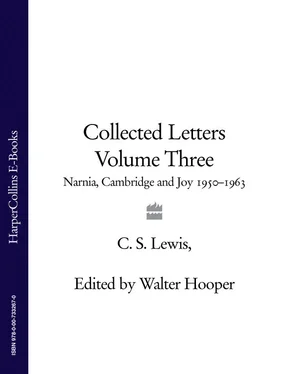About obedience, the principle is clear. Obedience to man is limited by obedience to God and, when they really conflict, must go. But of course that gives one v. little guidance about particulars. The converted party must pray: I suppose it is not often necessary to pray in the presence of the other! Especially if the converted party is the woman, who usually has the house to herself all day. Of course there must be no concealment , in the sense that if the question comes up one must say frankly that one does pray. But there is a difference between not concealing and flaunting . For the rest (did I quote this before?) MacDonald says ‘the time for speaking seldom arrives, the time for being never departs.’ 145 Let you and me pray for each other.
Yours sincerely
C. S. Lewis
TO VERA MATHEWS (W): TS
RER64/51.
Magdalen College,
Oxford.
18th October 1951.
Dear Miss Mathews,
Your nice parcel of the 6th September has just arrived, and has I see been opened by our Customs people—which rarely happens. What they saw suspicious about it I can’t imagine. I suppose what happens is that they open one parcel in every hundred or so as a routine check.
I feel sure that you won’t be offended if I tell you that I have—with great reluctance—sent your gift straight on to some one else, whose need is much greater than mine. It has gone to a particularly hard hit member of the most unfortunate class in this country: an elderly lady (65), who has always had a struggle to make ends meet, and who, owing to a failure of dividends, is now on the verge of actual want. No doubt you have seen in the papers that we are caught in what the economists call ‘an inflationary spiral’; so far this has not apparently touched the working classes, but amongst the elderly, living on dwindling investment income in a world of rising prices, there is already discomfort, hardship, and I fear in many cases, real suffering. And to the lady in question, your parcel will be a real Godsend.
Our elections take place this day week, and I shall not be sorry when they are over. Already everything possible seems to have been said by every possible candidate, and the reiteration becomes wearisome. There seem to be good prospects of putting Labour out, in spite of the fact that they are promising the earth, whereas Churchill, with his usual good sense, is promising nothing but hard times.
I hope you are keeping well; we both are. With many thanks (should I also say apologies?), and all good wishes,
yours sincerely,
C. S. Lewis
TO WENDELL W. WAITERS (P): 146 TS 147
REF.413/51
Magdalen College,
Oxford.
25th October 1951.
Dear Mr. Watters,
Yes. I am not surprised that a man who agreed with me in Screwtape (ethics served with an imaginative seasoning) might disagree with me when I wrote about religion. We can hardly discuss the whole matter by post, can we?
I’ll only make one shot. When people object, as you do, that if lesus was God as well as Man, then He had an unfair advantage which deprives Him for them of all value, it seems to me as if a man struggling in the water shd refuse a rope thrown to him by another who had one foot on the bank, saying ‘Oh, but you have an unfair advantage’; it is because of that advantage that He can help. 148
But all good wishes: we must just differ: in charity I hope. You must not be angry with me for believing you know: I’m not angry with you!
Yours sincerely,
C. S. Lewis
TO HARRY BLAMIRES (BOD): TS
RER401//51.
Magdalen College,
Oxford.
29th October 1951.
Dear Blamires,
I hope my refusal will rank as a very ‘flat’ one. 149 I am struggling with a preface for another book at the moment and wishing I’d never undertaken it! 150 I don’t believe I would really do you any good, for [I] think the Educational world is rather anti-me. I could write a paragraph– the sort of thing that comes out in the catalogue or on the dust jacket. I’m sorry. But I must get out of these ‘little jobs one after another’ that, in the aggregate, really cripple one.
Yours,
C. S. Lewis
TO SHELDON VANAUKEN (BOD): PC
Magdalen College
Oxford
5/11/51
How is the Back? And if it is better, cd. you come and dine with me on Wed. next 7 (not dressed: call in my rooms at 7. sharp) or, if that is not convenient, cd. you lunch at 1 o’clock the same day? My duty to your wife
C. S. Lewis
TO HERBERT PALMER (TEX): 151
20/11/51
‘To which’ [i.e. to Rhetoric] ‘poetry would be made subsequent, or indeed rather precedent, as being less subtle and fine, but more simple, sensuous, and passionate’– Tractate on Education (Prose Wks , Bohn’s Edtn. Vol. Ill, p. 473.) 152
Bad luck on ‘impassioned’ wh. he certainly did NOT say, whatever E.S. may think. I imagine, tho’, that passionate and impassioned meant v. nearly the same.
I’m afraid I never see the Fortnightly , but will look out for yr. article if I do. 153 I am v. sorry you have been so ill and hope there is a better time coming. I’m alright. Blessings–
C.S.L.
TO I. O. EVANS (W):
Magdalen etc.
27/11/51
Dear Evans
(I wish you wouldn’t doctor or mister me!) I was a pig not to send you a Caspian , but you know how, at the moment of making out one’s list one has first 3 names wh. some recent event makes obvious, and after those one can only think either of 100 people or no one. I now rectify the omission. I am delighted that it pleased you. I look forward v. much to the ‘booklets’. The conception sounds excellent and, I hope they will be a great success.
Yours
C. S. Lewis
TO WILLIAM L. KINTER(BOD): TS
REF.310/51.
Magdalen College,
Oxford.
27th November 1951.
Dear Mr. Kinter,
Thank you for your kind letter of the 19th. What it is to have a real reader! No one else sees that the first book is Ransom’s enfances: 154 if they notice a change at all, they complain that in the later ones he ‘loses the warm humanity of the first’ etc.
All the best.
Yours sincerely,
C. S. Lewis
TO MISS TUNNICLIFF (P):
Magdalen College,
Oxford.
Dec 1st 1951
Dear Miss Tunnicliff
(1.) Oddly enough I have more than once thought of writing on the Problem of Pleasure . As for the title and subject of my actual book 155 [they] were not of my own independent choice: I had been asked to deal with that subject for a series. 156
(2.) ‘Rough male taste’ 157 is, of course, a metaphor. It still seems to me the right one—but of course all metaphors are touch-and-go and don’t appeal equally to all imaginations.
(3.) I did try so to write as to make people less angry. To say that they might be angry was part of the attempt.
(4.) You think I don’t go far enough about animals: others think I go too far. If I had gone as far as you wd. like I shd. have raised more incredulity. Yes—my treatment of freedom was crude & hasty.
(5.) No, I don’t think I can frame every sentence for reading aloud in mixed company. I think books on such subjects are best read in solitude.
With all good wishes.
Yours sincerely
C. S. Lewis
In his unpublished biography of his brother, most of which became Letters of C. S. Lewis (1966), Warnie Lewis wrote: ‘On 3rd December 1951 Jack received a letter from the Prime Minister [Winston Churchill] offering to recommend him for a C.B.E. in the New Year Honour’s List. Here is his reply:’ 158
Читать дальше












